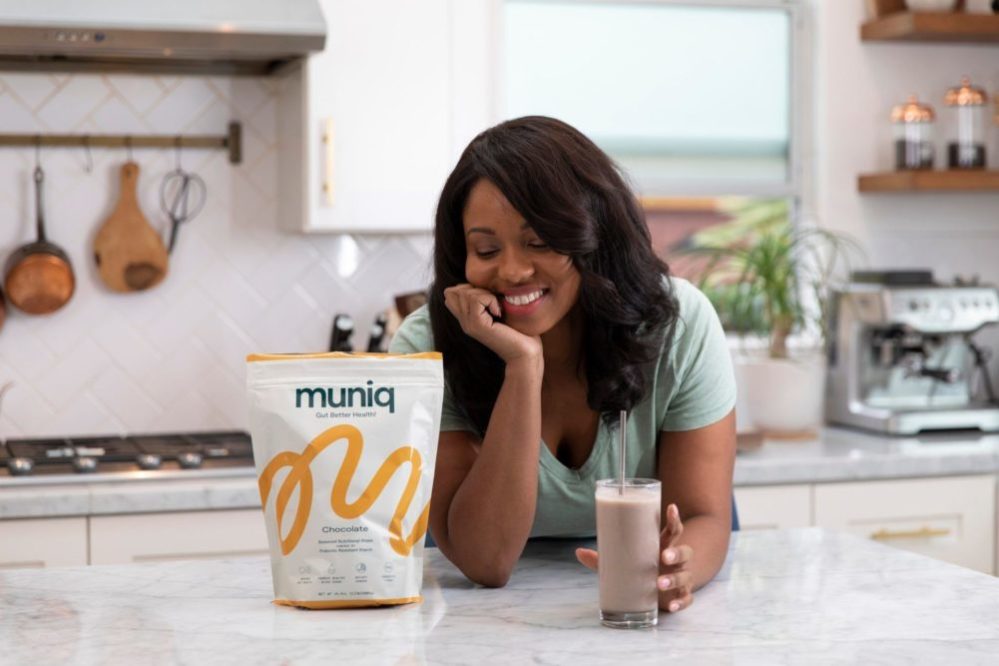A new year often means a new diet for many of us, especially as we try to remedy the bloated waistbands of our pandemic-induced holiday bingeing. Los Angeles-based Uplifting Results Labs is hoping to make that task easier with its healthful meal replacement shake, Muniq.
“Typically, people who have elevated blood sugar levels are either pre-diabetic or diabetic. They have tried so many different things, so many different fad diets, the latest and greatest product solution – and most of them have not worked and haven’t stuck over time,” founder and CEO Marc Washington tells AFN.
The startup just closed an $8.2 million Series A round led by Alpha Edison, Acre Venture Partners, and strategic investors including former pro basketball player Baron Davis and SimplyProtein founder Cathy Richards. An existing investor is The Production Board, which led Muniq’s seed round.
Launched in May 2020, Muniq’s line of nutritional meal replacement shakes are formulated with ingredients like prebiotic resistant starch, which can “dramatically improve blood sugar control, weight management, digestive health, and more,” according to the company. It offers five different flavors that come in a variety of serving sizes.
But the team is aware it first needs to combat some of the skepticism consumers may have developed around functional foods.
Although consumers are paying more attention to how their diet can help their vitality, Washington thinks the ‘food as medicine’ community can do more to deliver on the promise.
“There are not enough businesses and brands that have gone that extra step to actually prove out how their product works and to deliver true efficacy that can fundamentally transform people’s lives,” he says.
Prebiotic resistant starch
If you’ve never heard of resistant starch, you aren’t alone. The ingredient is relatively uncommon, according to Washington.
“Unfortunately it has been largely processed out of the Western diet,” he explains. “Unlike traditional carbs and starches, which our body breaks down right away and consumes for energy and spikes our blood sugar, resistant starch is kind of the opposite. It literally resists digestion.”
This leads to improvements in attaining a healthy weight and immune support, he says, adding that over 200 studies have demonstrated the health benefits of resistant starch in areas such as gut microbiome, digestion, and blood sugar control.
Muniq is also hoping to cultivate a better sense of community with its Muniq Lifers group, where shake-lovers can share their health journeys.
“The life-changing results experienced by Muniq customers exemplify the brand’s vast potential to address some of the most pressing health epidemics of our time,” Nate Redmond, managing partner at Alpha Edison, said in a statement.
There are a number of convenience-based, nutritional shake companies cropping up to capitalize on consumers’ desire to eat healthier. New York-based Daily Harvest has raised $43 million for its subscription meal replacer shake service, according to Crunchbase. In the healthcare world, Californian startup Kate Farms is developing organic plant-based shakes free of allergens to target individuals who are dependent on tube feeding. It closed a $51 million Series B round in November 2020, bringing its total funding to $74 million.
Figuring out which shake to try, which subscription service offers the best bang for your buck, and which ones suit your palate can be exhausting for some consumers. Many of the emerging startups in the space rely on slick branding and rather persistent social media campaigns to cut through the noise.
But the competitive landscape doesn’t faze Washington as much as the grim shadow that health crises like obesity cast on our plates.
“There is a lot of noise and, yes, there’s every fad diet out there you can imagine. There are many different products, food, beverages, supplements, shakes,” he says.
“But when you compare where the better-for-you industry is relative to the demand and the need, the problems that we can help solve are massive. And frankly, they’re only getting worse.”





